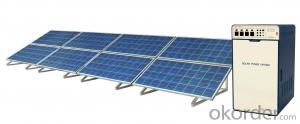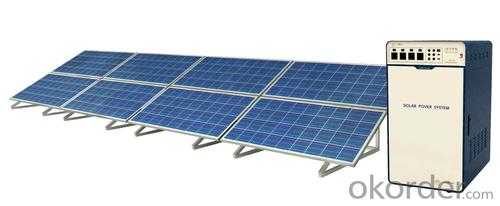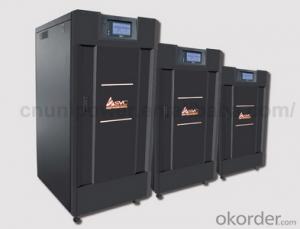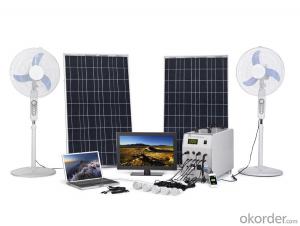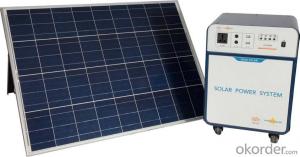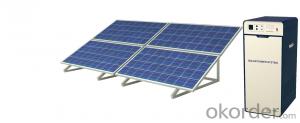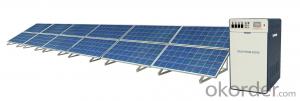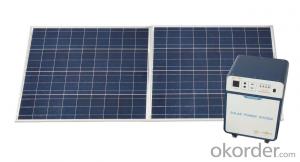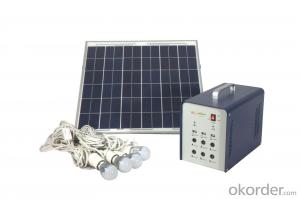Suncraft Solar Energy Systems JS-SPS-2000 Off-Grid Solar Power System
- Loading Port:
- Tianjin
- Payment Terms:
- TT OR LC
- Min Order Qty:
- 10 set
- Supply Capability:
- 10000 set/month
OKorder Service Pledge
Quality Product, Order Online Tracking, Timely Delivery
OKorder Financial Service
Credit Rating, Credit Services, Credit Purchasing
You Might Also Like
General Introduction
Solar power system provides alternating current and direct current, which is produced by the modules transforming solar power into power, to home lighting, household appliance and other DC appliance, such as cell phone and laptop.
Solar power system is widely used in area lack of power, for example house power supplying, monitoring, communication base, fire prevention in forest area, pasture and meadow, aquaculture etc.
We are dedicated to provide high quality off-grid PV products and systems to customers and has received a series of certificate, including ISO9001, TUV, UL, CE, CQC and RoHS.
Off-grid Solar Power System
High efficent PV module can produce more power.
Sine wave output is suitable for all kinds of load. Varieties of DC output, let it more
convenient for users.
The multifunction design make it easy to operation and maintenance.
Solar power system provides alternating current and direct current, which is produced by the modules transforming solar power into power, to home lighting, household appliance and other DC appliance, such as cell phone and laptop.
Solar power system is widely used in area lack of power, for example house power supplying, monitoring, communication base, fire prevention in forest area, pasture and meadow, aquaculture etc.
We are dedicated to provide high quality off-grid PV products and systems to customers and has received a series of certificate, including ISO9001, TUV, UL, CE, CQC and RoHS.
Off-grid Solar Power System
High efficent PV module can produce more power.
Sine wave output is suitable for all kinds of load. Varieties of DC output, let it more
convenient for users.
The multifunction design make it easy to operation and maintenance.
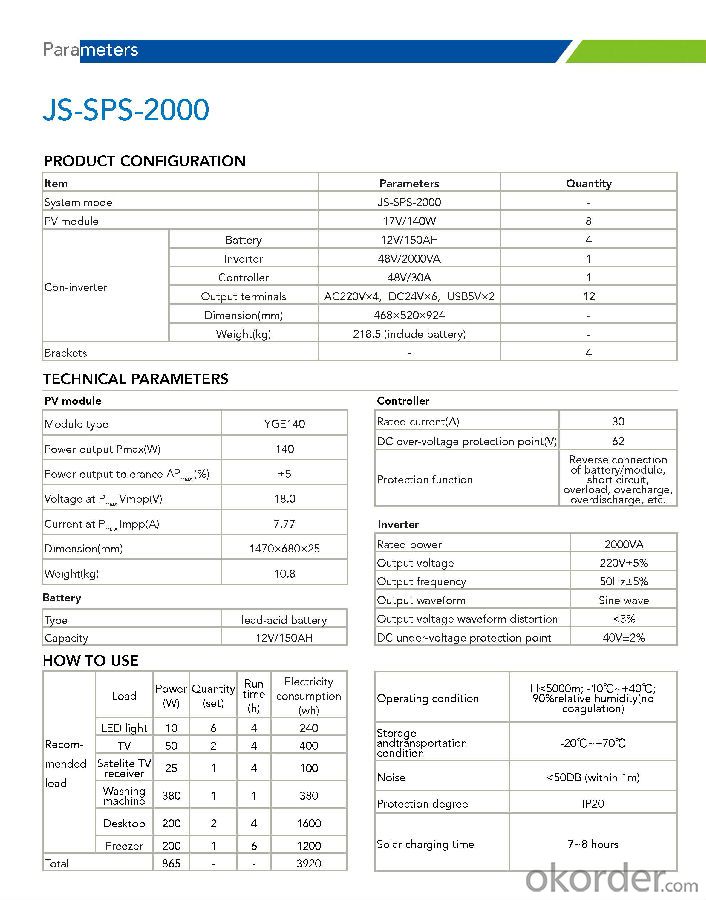
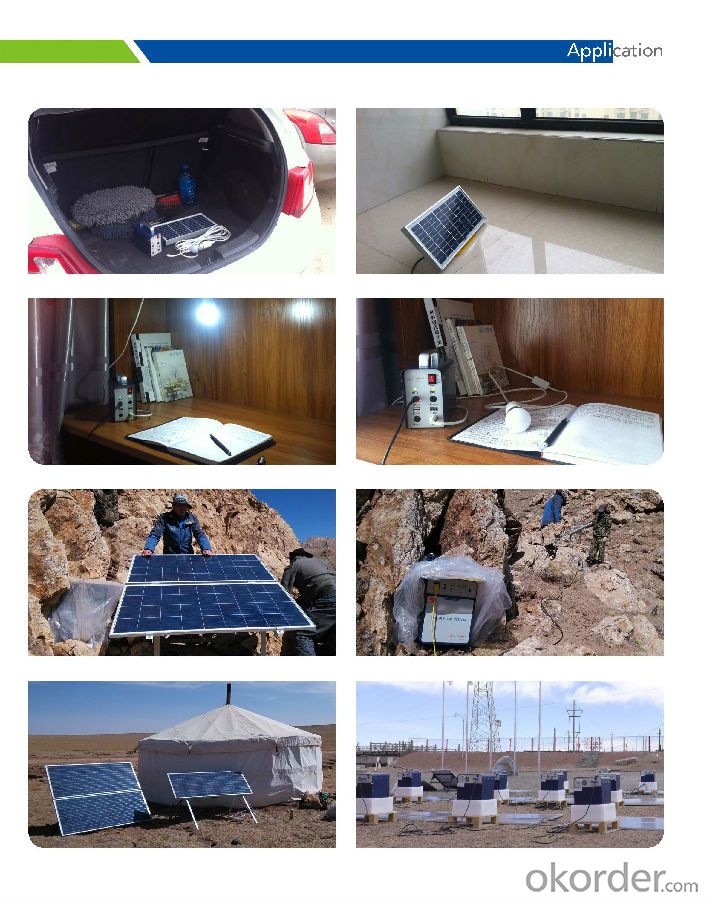
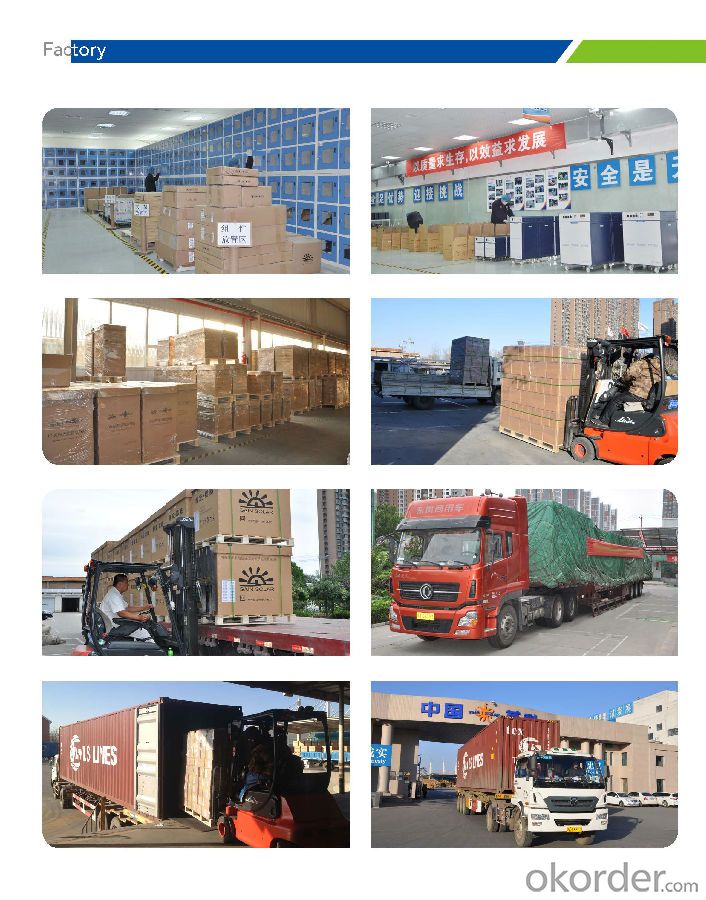
- Q: Solar photovoltaic system
- Analysis of economic benefits: 50kW distributed photovoltaic PV power plant total operating period: 25 years of this project on average generating capacity: the annual average generating capacity of 200kWh: 73000kWh, 25 years of total power: 1825000kWh residential electricity price: 0.55 yuan /kWh local coal-fired power benchmark price: 0.44 yuan /kWh (the case): Total investment the total investment of about 450 thousand yuan, equivalent to 9 yuan / watt.
- Q: Are there any noise concerns with solar energy systems?
- Yes, there are generally no noise concerns with solar energy systems as they do not have any moving parts and operate silently.
- Q: How do solar energy systems impact local wildlife?
- Solar energy systems can have both positive and negative impacts on local wildlife. On the positive side, these systems can provide habitat for certain species, such as birds or pollinators, by creating shade and shelter. Additionally, solar panel arrays can be designed to minimize ground disturbance and preserve existing vegetation, benefiting local flora and fauna. However, there are also potential negative effects, such as the risk of bird collisions with solar panels or the displacement of certain species due to changes in habitat. Proper planning, including strategic panel placement and wildlife-friendly landscaping, can help mitigate these impacts and ensure coexistence between solar energy systems and local wildlife.
- Q: Can a solar energy system be used to power electric vehicles?
- Yes, a solar energy system can be used to power electric vehicles. Solar panels can be installed on a roof or any other suitable surface to capture sunlight and convert it into electricity. This electricity can then be used to charge the batteries of electric vehicles, providing a clean and renewable source of energy. In fact, many people have already started using solar energy to power their electric cars, creating a sustainable and eco-friendly transportation solution. Additionally, advancements in solar technology have made it more efficient and cost-effective, making it an increasingly viable option for powering electric vehicles.
- Q: What is the impact of saltwater exposure on solar panels?
- The impact of saltwater exposure on solar panels can be significant and detrimental. Saltwater contains high levels of corrosive salts, such as sodium chloride, which can corrode the materials used in solar panels. This corrosion can lead to the deterioration of the panel's components, including the frame, wiring, and connectors. The primary concern with saltwater exposure is the damage it can cause to the protective coatings on the solar panel surfaces. These coatings are designed to protect the cells from environmental factors, including moisture and UV radiation. When saltwater comes into contact with these coatings, it can break them down, leading to the exposure of the solar cells. Once the cells are exposed, they become vulnerable to the corrosive effects of saltwater. The corrosive salts can attack the metal contacts and connections within the solar panels, leading to a decrease in their efficiency and overall performance. This corrosion can also cause electrical shorts or open circuits, which can render the solar panels completely non-functional. Furthermore, saltwater exposure can also lead to the accumulation of salt deposits on the surface of the solar panels. These deposits can reduce the amount of sunlight reaching the solar cells, thereby reducing their energy production. The salt deposits can also create an additional barrier between the sunlight and the cells, further decreasing their efficiency. To mitigate the impact of saltwater exposure, it is crucial to implement proper maintenance and cleaning procedures for solar panels in coastal or saltwater-rich environments. Regular cleaning using a non-abrasive solution can help remove salt residues and prevent the buildup of deposits. Additionally, using materials that are resistant to corrosion and saltwater, such as marine-grade aluminum or stainless steel for panel frames and connectors, can help prolong the lifespan of solar panels in these harsh environments. In conclusion, saltwater exposure can have a detrimental impact on solar panels, leading to corrosion, reduced efficiency, and potential failure of the system. Proper maintenance and the use of corrosion-resistant materials are essential to minimize the negative effects of saltwater exposure and ensure the long-term performance of solar panels in coastal or saltwater-rich areas.
- Q: What is the impact of temperature on the performance of solar panels?
- The impact of temperature on the performance of solar panels is that higher temperatures can decrease the efficiency of the panels. As the temperature increases, the electrical conductivity of the semiconductors in the solar cells decreases, resulting in reduced power output. This phenomenon is known as the temperature coefficient of the solar panel. Therefore, it is important to consider the temperature when designing and installing solar panels to maximize their performance and overall energy production.
- Q: Can solar energy systems be used in areas with high levels of wildlife activity?
- Yes, solar energy systems can be used in areas with high levels of wildlife activity. While it is true that wildlife can pose some challenges for solar energy systems, there are several ways to mitigate these issues. One of the primary concerns is the risk of damage to the solar panels by large animals or birds. However, there are various protective measures that can be taken to prevent this. For instance, installing fencing or barriers around the solar panels can help keep wildlife away. Additionally, using anti-reflective coatings on the panels can reduce the likelihood of bird collisions. Another concern is the impact of solar energy systems on wildlife habitats. It is crucial to choose the location of the solar panels carefully, considering the existing wildlife activity in the area. By conducting thorough environmental impact assessments and engaging with local wildlife experts, it is possible to minimize any potential negative effects on wildlife habitats. Moreover, solar energy systems can actually benefit wildlife in some cases. For example, solar farms can provide additional shelter and shade for some species, and the open spaces underneath the panels can create new habitats for ground-dwelling animals. Overall, while there may be some challenges, with proper planning and mitigation strategies, solar energy systems can be successfully utilized in areas with high levels of wildlife activity.
- Q: Can a solar energy system be installed in a remote location without access to the electrical grid?
- Yes, a solar energy system can be installed in a remote location without access to the electrical grid. Solar energy systems consist of solar panels, batteries, and inverters, which can generate and store electricity from the sun's energy. This self-contained system can provide power to remote locations, allowing them to operate independently of the electrical grid.
- Q: What permits are required to install a solar energy system?
- The permits required to install a solar energy system can vary depending on the location and specific regulations of the area. However, there are generally a few common permits that are required in most jurisdictions. Firstly, a building permit is typically necessary for the installation of solar panels or any structural changes that may be required. This permit ensures that the system is installed safely and meets the building codes and regulations of the area. Secondly, an electrical permit is often required as the installation of a solar energy system involves the connection of electrical components. This permit ensures that the electrical work is carried out by a licensed electrician and meets the electrical safety standards of the area. In addition to these permits, some jurisdictions may also require other specific permits or approvals. For instance, a zoning permit might be necessary to ensure that the installation complies with the local zoning laws and does not violate any height restrictions or setback requirements. It is important to note that the permit requirements and processes can vary greatly, so it is always recommended to check with the local authorities or building department to determine the specific permits required for installing a solar energy system in a particular area. Working with a reputable solar installer or contractor can also be helpful as they are typically familiar with the local permit requirements and can assist in obtaining the necessary permits.
- Q: Are there any risks of electrical hazards during installation or maintenance of solar energy systems?
- Yes, there are risks of electrical hazards during the installation or maintenance of solar energy systems. Solar energy systems involve working with high-voltage DC (direct current) electricity, which can pose dangers if not handled properly. Some of the potential risks include: 1. Electrocution: Solar panels generate electricity, and if not isolated or disconnected properly, there is a risk of electrocution for individuals working on the system. 2. Fire Hazards: Faulty wiring, loose connections, or improper installation can lead to electrical arcs and sparks, which can ignite a fire if proper precautions are not taken. 3. Falls and Injuries: Solar panels are typically installed on rooftops, which may involve climbing ladders, working at heights, and handling heavy equipment. If not done with caution, it can result in slips, falls, or injuries. 4. Arc Flash: When working on live electrical equipment, there is a risk of arc flash, which is a sudden release of energy that can cause severe burns, hearing damage, and even death. 5. Environmental Risks: While not directly related to electrical hazards, it is essential to consider potential environmental risks during the installation of solar energy systems. For instance, improper disposal of hazardous materials used in solar panels, such as lead, cadmium, or other toxic substances, can harm the environment if not handled correctly. To mitigate these risks, it is crucial to follow proper safety protocols and guidelines during the installation and maintenance of solar energy systems. This includes wearing personal protective equipment (PPE), ensuring proper grounding and isolation procedures, using insulated tools, and following all local electrical codes and regulations. It is also recommended to hire trained and certified professionals for the installation and maintenance to minimize the risks associated with electrical hazards.
Send your message to us
Suncraft Solar Energy Systems JS-SPS-2000 Off-Grid Solar Power System
- Loading Port:
- Tianjin
- Payment Terms:
- TT OR LC
- Min Order Qty:
- 10 set
- Supply Capability:
- 10000 set/month
OKorder Service Pledge
Quality Product, Order Online Tracking, Timely Delivery
OKorder Financial Service
Credit Rating, Credit Services, Credit Purchasing
Similar products
Hot products
Hot Searches
Related keywords
